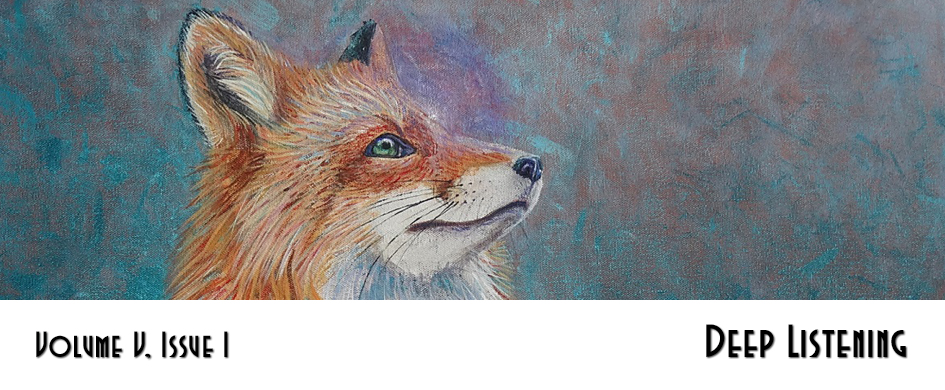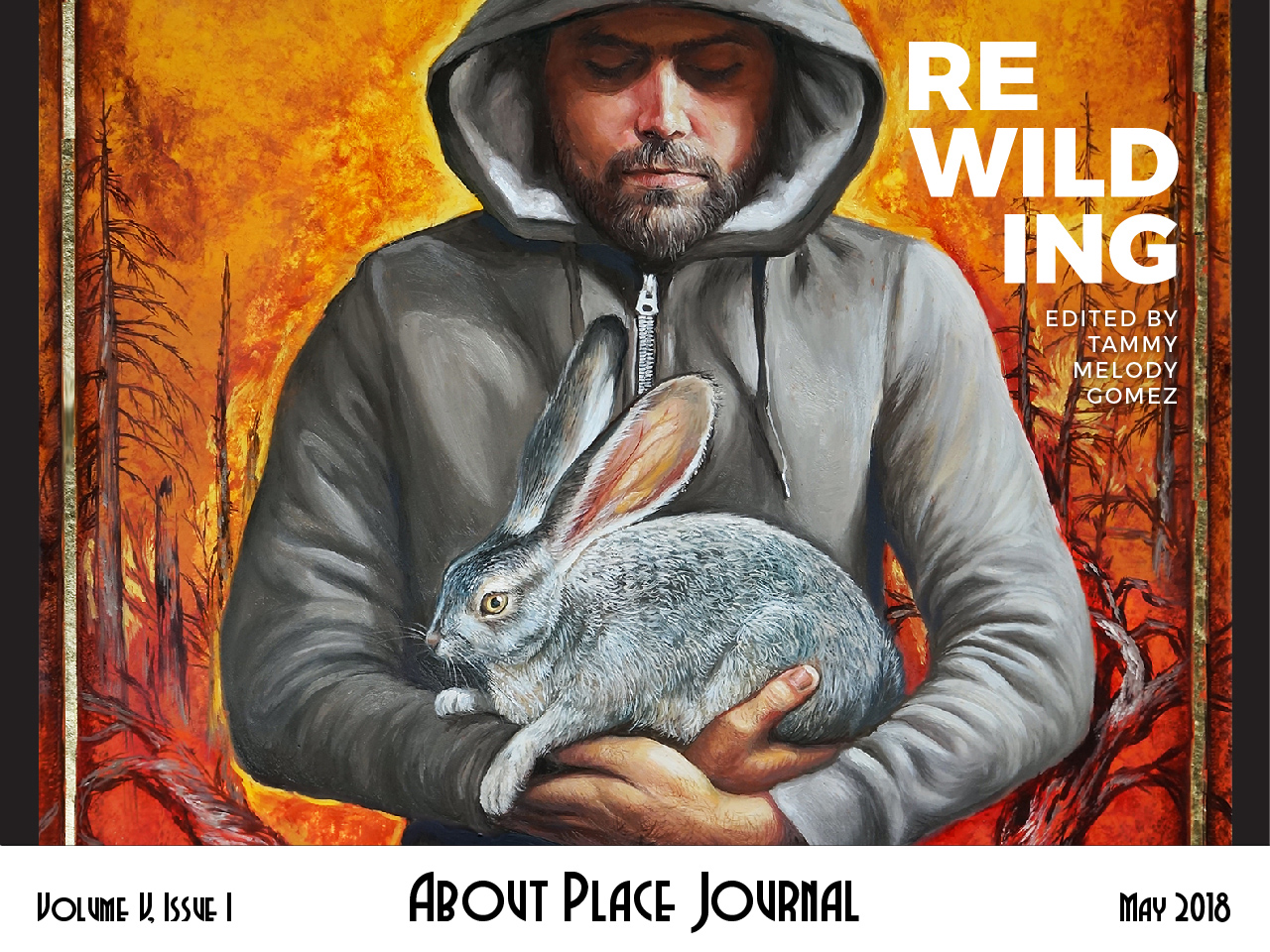The fox that came to the ash in service, as though a familiar spirit, had a coat heavy with rain from the trees. Black stalks broke from the pits and ears, but his muzzle was bright, newly cleansed by the snow and running water. Recalling some hardship or trial, the wounds on his body blushed red in the cold, each a stray fire in a night of griefs when only small things could find respite in the voids of the wood. At the close of the year he made for the south and the shrine of the grey where once his fate had been espoused. In the first of winter days, when his work began, his offerings had put him in court with his god: with wing and bone, a stone or drinking cup, the rite was sealed and all things squared, just as each tableau was intended to serve as markers of a vernal rhythm.
The ash leaves were white and brown in the meadow he climbed on the sabbath to reach the woods margin. They had settled so thick by the hedge that his paws would sink as he went or otherwise he was bewildered by the sun’s low light of briar and thorns. Celebrant and sacrifice he was amidst the nursery wands of the poplar trees; a magician of sorts newly made by the birds by reason of the bones he sought and upon which his labours were dependent. Never once was his gathering for favour or decoration, or ever was it stolen, but guided only by faith in the voices of the subtle dead. For he thought the animal body orphic still though the spirit had flown. He would constellate a lost world in posthumous fire, and though the way was one of spoil and repair, an original sound survived for him that from the dirt and wastes could be articulated.
The green bird slept, and lightly, in the fox’s maw as he travelled with intent through the twilit wood. It must have died to the trees a few hours since, for its blood would weep at times in the path, and the snowy down of the underside felt warm to his tongue. In his famine he had licked the feathers and nudged the bird without a bite, though coffled by yule to whim and anguish. The silver had come to his mind on a travelling wind so that the time forbade his share. As servant of the lamp, he would not eat the body wrought as if in bargain by gods in trade for the light he coveted.
There was in the wood a secret place concealed by scrub and lips of neglected pasture settled by blackthorn and ash. The narrow trees would yield only to rubrics of wind and water or to the nocturnal traveller of uncommon cause. Encoder and cipher, maker of signs and seasons, his countenance that was at noon a spell in scarlet, trembled in the dusk a purple map of days; as if his line of flight or markings on his face would to the allegiant impart the ways to the hollows of the wood. Always they had felt by him to be the space most sought in life, as once perhaps his sires revered the quarter days as much as the rites and plays of midwinter, or when the wood’s edge was deemed by them oracular as the mouth of the holy spring. It was ground for the living creatures to attest to a man’s transformative illness, or for their dead to reveal, in augury or consonance, a means by which he could atone for his sins against them.
Such brief intimacies are news to the universe, but the fox did not accept his own as evidence of an animal beatitude. Where his lines of moon and stars converged with men, was it not that their personal quests were corollary to his that seemed always in possession of an ultimate answer? Though men had come to think of him as servant to their imagination, his perceived benignity was, he thought, a consequence only of sheer presence. There is wood magic but it has a passive quality, as if some incense lingers in the glade where fauns and birds have performed of late the bloody rite.
Perhaps, he thought, the lights in the forest are ways for men to negotiate the meaning he had for them without him otherwise displaying interest or agency. If he had moved from the beginning in currents of a storied god, then always he would affect in them, from his standpoint of indifference, new fires of initiation and rebirth. The moon and the sun were his winter burden, but he carried the lamps each year from the pit to illumine, with apparent detachment, the houses of their suffering. It was in this light that the men of the trees once served their rites of propitiation. The territorial god, upon whom their fates depended, would survive always through the animal voice that harbours still not only these rhythms of death and renewal but which is aegis against the breaking of kingdoms. The old magicians knew that only in death would they hear, for the first and incomparable time, the animals speak. They could not take their words back to the living, and thus the realisation was for them a stone in the gut, become, in their lore and their practice, fruit of the rule. Why do men no longer accept the unknown in the beasts, he thought, the certainty of never fully comprehending them? It would make for a world far less removed from dreams of the miraculous. To form an alliance with dispassionate things and court them for dependence upon their quiet prophecies. Perhaps they should, moreover, recognise in them the labours of the shadow, for some fate at work in their image that brings a punitive cleansing. For they can as much expect from the animal dead the force of a corrective will as hope for rituals of absolution.
The fox lifted his nose to the wind that rattled the hawthorn twigs. He could smell the great sea behind all things that was to him always a presence unseen, explicit through absence. If once at the verge it should reveal itself to meagre lives, then perhaps, he thought, they would know their trials and labours interrupted, just as the chronicle of each man is marked by lights of kings and talismans. The wind came up from the valley, through the long tunnel formed by arching trees, and made for the night. He knew it was searching only for those spores that would ground the spring, just as the light that was birthed in the hollow had in old time sought the northern sky. It twinkled in the growing dark between the branches, and the fox could think of no service but to fill the broken dish upraised in good omen for his kind.
He passed beyond the hawthorn scrub into lower ground of marsh and streams. There was no path but that made by roots and fallen boughs or, here and there, the islands of the alder trees. Beneath the rounds, the bulbs of kingcup and primrose drew the future earth, compressed and watchful. He could feel the promise in the winter flowers and wings discarded at the marches or, in the proper shrine, the potsherds and the shining coin. In one such piece he could see that threads were drawn between two wheels turning, side by side, in winter fire; or else they were to him snowflakes intricately revealed as once the saintly bones had been. For he had guessed what rhythm snatched from inevitable pain had led the boar into the marsh, and how he must have sought the willows that lined the isle of the father ash. About the woods, the fox had smelt his bloody sweetness, how he had curled into his final sleep between two roots that made beneath that tree the entrance to a bygone earth. The first spring had breached his fur so that each succeeding day revealed him further as a star in widening rings of silver and black. The crows fed from him and April had such heat that he sank into a point of yellow flowers until only the broken ribs were seen as a bank for stems that itself was lost to earth and water. Into that boneyard in after days the fox had brought his scraps of golden paper strewn about the hills and lanes, or from the woods the winter colours of fruits and branches. He looked out, especially, for the tiny creatures of the verge full of the breath that brought forth flame for suns from earth and body. For he was never autonomous and neither was he self-contained, so that he moved and flowed with those things taken, in and out of his totems made from the feathers and bones.
There was a ledge above the earth dressed with the offerings of the years, and onto that rough altar he lowered, with tenderness and care, the bird of the long tongue. A shout came down from the farm on the ridge and though he could hear, a little further still, the hum of the road, never once had he known the isle to be disturbed, and he remained at the shrine with his senses turned more so to duty. He sniffed the air once more and his ears twitched, as though a time was told in the aspect of the night, and he had assent to draw out the trapped voice. From eye to tip he slid his claw to release the breath. There came a soft sound of rushing air and the body shrank a little, so that he felt assuaged, sensing the efficacy of his vow.
In their own way the animals will vie, in the long stillness of their dark, against cruel fires; as if the truth is now made of two worlds in opposition, as when they meet the works of men. What is theirs is the time before the dawn, that which is not entirely of the sun but moves to an altogether different order. They preserve themselves in mysteries of ulterior space and, no matter our articles of disinheritance, this much at least they retain. The fox waited and the light came, crackling beneath the branches, out of the shrine, brief as the voice of the bird had been and as rare; in his belly and in his lungs the dark secured by a god that works an immutable grace; in a white fire his face illuminated.


